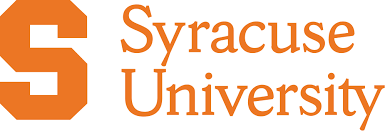

Syracuse University
Biology
Study detals
: Bachelor's degree : B.S. Biology : Full time : 36 MonthRequirements
If you have completed academic work outside the U.S., you must provide official academic credentials as well as English translations of the documents. If only one document is available, we will accept notarized or certified copies of the original document. If translations are needed, it is your responsibility to have the credentials translated by a reputable translation and evaluation service. Syracuse University will not provide translations for you. A key to the marking system or grading scale should also be included if it is not indicated on the transcript.
- First-year Students: Attending and graduating from in-person secondary schools based in the United States for at least three full academic years (Grades 10-12).
- Transfer Students: Have completed at least 24 credits in person at a post-secondary institution in the United States. Students must have earned a cumulative GPA of 3.0 or higher, excluding ESL curriculum.
English Language Requiements
- IELTS is not required. as part of the admission process all students will take the VEPT test administered by interlearn
- VEPT costs - (50$)
Pre-Sessional (20 weeks) 37 - 40
Pre-Sessional (12 weeks) 41 - 45
Pre-Sessional (6 weeks) 46 - 50
Inernational Year One - 51+
Speciality
International Year One in Available (47 200)
Please note that students completing the British curriculum are not eligible to apply upon completion of the IGCSE/GCSE; we require at least one additional year of education. Additionally, we do not accept the BTEC for admission at this time.
Progressing students into Syracuse University receive the following merit awards for each
subsequent year of enrollment based on the cumulative GPA earned upon the completion of the 30 credit hours:
• A GPA between 3.25 and 3.49 is $10,000 per year
• A GPA between 3.5 and 3.74 is $15,000 per year
• A GPA greater than 3.75 is $20,000 per year
Additional information
Degree Overview
The major in biology leads to either the B.A. or the B.S. degree. The B.S. degree is intended for students interested in graduate study in biological science or the health professions (medicine, dentistry, or veterinary medicine). In addition to biology requirements, students pursuing a B.S. degree take general chemistry, organic chemistry, and calculus. Students pursuing the B.S. degree are also able to personalize their curriculum with elective courses in one of five tracks: Biological Sciences; Ecology and Environmental Science; Genetics, Genomics, and Evolution; Integrative and Biomedical Sciences; and Molecular, Cellular, and Developmental Biology. Students are also encouraged to gain practical experience and academic credit through the University.
Study Reasons
Take small seminar courses with fewer than 15 students and build close relationships with faculty as you learn about their unique research interests, studying life from molecular, cellular, organism, community and global perspectives.
Learn by doing as you complete independent research and/or pursue internships.
Get advice for success through the Department of Biology’s peer mentoring program, then serve as a mentor yourself during your junior or senior year.